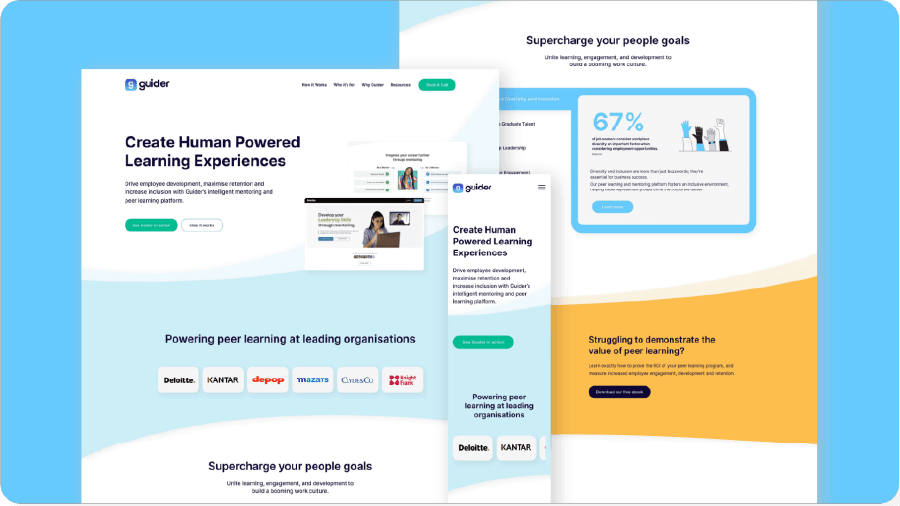
Imagine this: you’ve poured time, effort, and passion into your business. The vision is crystal clear, your product is ready to revolutionise the market, and your team is poised to make waves. But then reality hits—you’re invisible online.
Without a cohesive SEO and web development strategy, and a structured development process, even the most innovative startups can struggle to gain visibility. These two elements must work together seamlessly to ensure your business not only attracts traffic but also converts visitors into loyal customers.
But there’s an answer: SEO tailored to your business needs and a solid web foundation. With the right strategy, you can increase your online presence, reach your target audience, and grow your business. This guide will walk you through the essentials of SEO for startups and professional services in the UK.
For many startups, SEO can feel like just another checkbox in a marketing strategy. But it’s far more than that—it’s the backbone of your digital presence. SEO doesn’t just drive traffic; it positions your business in front of customers who are actively searching for solutions, creating genuine connections.
When your site ranks at the top of search results, you’re not just attracting clicks—you’re building credibility. SEO establishes your authority, builds long-term value, and helps you compete in an increasingly crowded market. It’s the foundation for sustainable growth.
In today’s digital landscape, SEO is not just a marketing tactic; it’s a foundational strategy for startups looking to build visibility, credibility, and long-term success. With over 5.30 billion internet users globally, the potential reach for startups is immense.
By implementing effective SEO solutions early on, startups can drive organic traffic, reduce dependency on paid ads, and build trust with their target audience. A well-optimised website ensures sustainable growth, connecting businesses with potential customers at the exact moment they’re searching for solutions, creating a lasting competitive edge.

Cost Efficiency: SEO is an investment in organic growth. Unlike expensive paid ads, SEO generates over 20 times more traffic opportunities and brings in traffic without ongoing costs.

Building Trust: Ranking high in search results helps build trust. When users consistently see your brand in searches, they start to associate it with authority and reliability.

Local Reach: Optimising for local SEO allows your business to be found by people in your area who need your services. Local SEO drives 28% of local searches to a purchase.

Long-Term Results: Unlike short-term paid campaigns, SEO builds sustainable results. A well-optimised site will continue to attract traffic even after the initial work is done.
For startups looking to get a toehold in the market investing in SEO early gives you a big advantage over your competition.
A successful SEO strategy isn’t just about getting more traffic—it’s about driving the right traffic and aligning SEO efforts with your business objectives.
Start by defining what success looks like for your startup. Are you aiming for more organic traffic? Higher-quality leads? Improved brand visibility? Answering these questions will help you create a strategy that is focused on outcomes rather than just activities.
Here’s a breakdown of the core elements of an SEO strategy built for results:

Keyword Research:
The foundation of any SEO plan. Start with tools like SEMrush or Ahrefs to uncover what your audience is searching for.
Focus on finding both high-traffic keywords and long-tail phrases that align with user intent. For instance, while competitive keywords can bring visibility, long-tail keywords—like “best AI tools for small businesses”—can drive more qualified leads.

On-Page SEO:
This is where you optimise the content on your site, making sure it aligns with your target keywords. Every page should have well-crafted meta titles, descriptions, headers, and content that not only satisfies search engine crawlers but also provides value to the user.
For example, a tech startup could create product pages that clearly explain their solutions while being optimised for specific queries, such as “AI solutions for healthcare.”

Technical SEO:
Your website’s backend needs to be optimised to ensure it’s fast, secure, and easy for search engines to crawl. This includes page load speed, mobile responsiveness, and eliminating broken links. Did you know that 53% of mobile users abandon sites that take longer than 3 seconds to load?
A slow website can hurt your rankings and lead to missed opportunities.

Content Strategy:
High-quality content drives engagement and positions your brand as an authority in your niche. Companies that blog regularly can attract 55% more website visitors.
A solid content strategy not only addresses your audience’s pain points but also integrates SEO-friendly elements like keyword-rich blog posts, how-to guides, and case studies.

Link Building:
Quality backlinks from authoritative websites are key to boosting your domain authority and driving rankings. Building a link profile is a long-term effort, but it’s crucial.
For example, gaining backlinks from respected industry blogs or directories can give your website the credibility it needs to climb the search rankings.
By focusing on these pillars, you’ll develop an SEO strategy that’s not only about attracting visitors but also about turning those visitors into loyal customers.
No two businesses are the same, so why should their SEO strategies be identical? A bespoke SEO solution is essential for startups looking to stand out.
When we worked with Planeta Analógico, a company specialising in audio equipment, we didn’t apply a generic SEO strategy. Instead, we created a tailored solution focused on designing an intuitive eCommerce platform optimised for SEO.
This approach highlighted the brand’s unique identity and provided a seamless user experience, helping them engage better with their niche audience.
This is the starting point for any technical SEO project. An comprehensive SEO audit evaluates your website’s current state, highlighting technical errors such as:

Targeted Results:
A tailor-made SEO strategy addresses the specific needs of your audience. Whether you’re in professional services or retail, your audience searches for different things and engages in different ways. Custom SEO allows you to speak directly to them.

Industry-Specific Solutions:
Different industries require different SEO approaches. For a retail company like Planeta Analógico, we focused on local SEO and product optimisation, while other industries might need content-driven strategies or technical SEO enhancements.

Scalability:
As your business evolves, your SEO strategy should grow with you. Bespoke SEO solutions allow for flexibility and adaptation, so your strategy continues to meet new challenges and opportunities.
With a custom approach, LIBRA 4 humans ensures that every SEO strategy aligns with your business’s unique goals, driving sustainable growth and long-term results.

A strong SEO strategy is only as good as the website it supports. Web development and SEO are deeply interconnected, and without a solid web foundation, even the best SEO efforts can fall short. Your website acts as the core of your digital presence, and ensuring it delivers a seamless user experience is critical for both search rankings and conversions.
Back-end developers use languages like PHP, Ruby, Python, and Java, with Ruby being a dynamic and object-oriented programming language, to build the logic and functionality that powers web applications. This ensures that the server, application, and database communicate effectively, providing a smooth and efficient user experience.
Website development is the process of building and maintaining websites, web applications, and mobile applications. It involves a combination of coding, design, and testing to create a functional and user-friendly online presence.
Website development can be divided into two main categories: front-end and back-end development.
Front-end development focuses on the client-side of the website, including the user interface and user experience, while back-end development focuses on the server-side of the website, including the database and server management.
There are several types of web development, each with its own focus and expertise:

Front-end Development:
This type of development focuses on the client-side of the website, including the user interface and user experience. Front-end developers use languages like HTML, CSS, and JavaScript to create visually appealing and interactive web pages.

Back-end Development:
Back-end development focuses on the server-side of the website, including the database and server management. Back-end developers use languages like PHP, Ruby, Python, and Java to build the logic and functionality that powers web applications.

Full-Stack Development:
Full-stack developers work on both front-end and back-end development, providing a comprehensive approach to building web applications. They have expertise in both client-side and server-side technologies.

E-commerce Development:
E-commerce developers build online stores and e-commerce platforms. They focus on creating secure, scalable, and user-friendly websites that facilitate online transactions and provide a smooth shopping experience.

Responsive Design:
With mobile traffic surpassing desktop usage, Google now prioritises mobile-first indexing. A mobile-friendly site ensures your users can access and navigate your content effortlessly on any device. Using modern JavaScript libraries like React can help create reusable UI components, enhancing the efficiency and interactivity of your website.
For example, if a potential customer lands on a site that isn’t responsive, they’re more likely to leave, which increases bounce rates and harms rankings.

Page Speed:
Did you know that 53% of users abandon a site if it takes longer than three seconds to load? Slow websites don’t just frustrate users; they also negatively impact your SEO.
Google rewards faster websites with higher rankings because they provide better user experiences. By optimising images, leveraging browser caching, and minimising code, you can significantly improve load times.

Website Security:
Implementing HTTPS is now a must for any website. Google has made it clear that security is a top priority for ranking websites, and sites without an HTTPS protocol are flagged as “not secure.” This damages trust with visitors and search engines alike.

Content Structure:
Proper organisation of your website content ensures that both search engines and users can easily navigate and understand your site. Use clear headings, subheadings, internal linking, and descriptive alt text for images.
This not only improves the user experience but also makes it easier for search engines to crawl and index your content.
When LIBRA 4 humans collaborated with Guider AI, we took a comprehensive approach, focusing on user experience and SEO performance. A skilled web developer played a crucial role in restructuring the site’s layout and modernising the design.
By restructuring the site’s layout, modernising the design, and optimising for fast load times, Guider AI experienced increased user engagement and longer session durations.
This highlights how closely web development and SEO work together to achieve meaningful business results.

Creating SEO-friendly web pages requires careful planning and strategy. Here are some tips to consider:

Conduct Keyword Research:
Identify relevant keywords and phrases that your target audience is searching for. Use tools like SEMrush or Ahrefs to find high-traffic keywords and long-tail phrases that align with user intent.

Optimize Your Website’s Structure:
Use a clear and consistent hierarchy of pages and categories. This helps search engines understand the organization of your content and improves user navigation.

Use Header Tags:
Use H1, H2, H3, etc. tags to structure your content and highlight important keywords. This not only helps search engines understand the content but also improves readability for users.

Write High-Quality Content:
Create engaging and informative content that provides value to your users. High-quality content is more likely to be shared and linked to, which can improve your search engine rankings.

Use Meta Tags:
Use meta title, meta description, and meta keywords tags to provide search engines with information about your page. Well-crafted meta tags can improve click-through rates from search engine results.

Optimize Images:
Use descriptive alt tags and file names that include your target keywords. Optimized images can improve your website’s visibility in image search results and enhance accessibility.

Use Internal Linking:
Link to other relevant pages on your website to help search engines understand your content hierarchy. Internal linking also keeps users engaged by guiding them to related content.
There are several web development languages and tools that are commonly used in the industry. Here are some examples:

Hypertext Markup Language (HTML):
Used for structuring and formatting content on the web. HTML is the backbone of web pages, providing the basic structure and elements.

Cascading Style Sheets (CSS):
Used for styling and layout of web pages. CSS allows developers to create visually appealing designs and responsive layouts.

JavaScript:
Used for creating interactive web pages and web applications. JavaScript enables dynamic content, animations, and user interactions.

PHP:
Used for server-side scripting and building dynamic web pages. PHP is widely used for creating content management systems and web applications.

Ruby:
Used for building web applications using the Ruby on Rails framework. Ruby on Rails is known for its simplicity and productivity.

Java:
Used for building enterprise-level web applications. Java is a robust and scalable language commonly used in large-scale web services.

Python:
Used for building web applications using the Django and Flask frameworks. Python is known for its readability and versatility.

Node.js:
Used for building server-side applications using JavaScript. Node.js allows developers to create scalable and high-performance web applications.
Launching and maintaining a website requires ongoing effort and attention. Here are some tips to consider:

Test and Debug:
Test your website for errors and bugs before launching. Ensure that all features and functionalities work as expected.

Optimize for Search Engines:
Optimize your website for search engines to improve visibility and ranking. Use SEO best practices to ensure your site is easily discoverable.

Monitor Analytics:
Monitor your website’s analytics to understand user behavior and improve performance. Use tools like Google Analytics to track key metrics and make data-driven decisions.

Update Content:
Regularly update your website’s content to keep users engaged and coming back. Fresh content can improve your search engine rankings and provide value to your audience.

Fix Broken Links:
Regularly check for broken links and fix them to improve user experience. Broken links can frustrate users and negatively impact your SEO.

Backup Data:
Regularly backup your website’s data to prevent loss in case of a disaster. Use automated backup solutions to ensure your data is safe and recoverable.
By following these tips, you can ensure that your website remains functional, user-friendly, and optimized for search engines, helping your startup achieve long-term success.
At LIBRA 4 humans, we believe that building a digital strategy goes beyond standard solutions. Our approach is driven by innovation, reliability, and collaboration—core values that guide every project we undertake.

Innovation:
We’re always exploring new ways to push the boundaries of digital design and SEO, ensuring our clients stay ahead of the curve.

Backup Data:
Our team is committed to exceeding expectations, delivering results you can trust.

Backup Data:
We work closely with our clients, aligning strategies to meet their unique business goals
With LIBRA 4 humans, you’re not just hiring an SEO team—you’re gaining a partner invested in your long-term success.
SEO is not a “set it and forget it” tactic. It requires ongoing attention, adjustments and refinement as your business grows and the market evolves.
For example we’ve been working with Planeta Analógico for over 2 years now. As their business has grown so has their need for more advanced SEO solutions.
We update their keyword strategy to target new opportunities in emerging markets and we’ve scaled their content to cover new topics in AI technology. This long term partnership has allowed Planeta Analógico to stay ahead of the competition and expand their digital presence across multiple markets.
Having a website that isn’t SEO-friendly can severely limit your business’s growth potential. A poorly structured site not only affects search engine rankings but also impacts user experience, leading to lost opportunities. Here are the key consequences:


Low Search Rankings:
If your site isn’t optimised for SEO, search engines will struggle to crawl and index your pages, pushing you lower in search results. Without proper keyword optimisation and technical SEO, you’ll miss out on organic traffic, with 75% of users never scrolling past the first page.

High Bounce Rates:
Slow load times and non-responsive design discourage users from staying on your site. A high bounce rate signals to Google that your site isn’t meeting user expectations, further harming your rankings.

Missed Local Opportunities:
If you don’t optimise for local SEO, your site won’t appear in search results for location-based queries. This could result in losing valuable nearby customers who are ready to purchase.

Security and Trust Issues:
Without HTTPS and proper security protocols, visitors may be greeted with “Not Secure” warnings, eroding trust in your brand. Google prioritises secure sites, so failing to implement HTTPS can reduce your rankings.
By neglecting the technical aspects of SEO during web development, you risk falling behind competitors who prioritise both functionality and visibility. Ensuring your website is SEO-friendly is essential for capturing leads and scaling your startup.
UK startups and SMBs building a digital presence takes time, strategy and a mix of the right elements: SEO, web development and ongoing optimisation. With bespoke SEO solutions your business can achieve long term growth, increased visibility and be a leader in your market.
Don’t let your startup blend into the background. With LIBRA 4 humans by your side, your business can shine in a crowded market. Let’s build a custom SEO strategy that not only increases visibility but drives sustainable growth.
Reach out to us today, and together, let’s put your business on the map.






Reach out to LIBRA 4 humans for expert guidance on tailor made SEO solutions.
Taking the first step often requires a leap of faith, and that's why we value these 30 minutes to understand the challenges your business faces.
Please complete a few questions so we can ensure our meeting is both efficient and productive.
Talk to you soon!